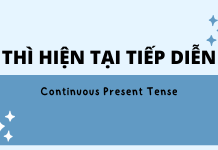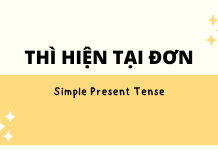Thì Hiện tại đơn (Simple Present Tense) là một trong những câu trúc ngữ pháp tiếng Anh quan trọng. Do đó, Socidemy đã chuẩn bị trọn bài bài tập thì Hiện tại đơn để giúp các bạn củng cố kiến thức!

1. Lý thuyết thì Hiện tại đơn (Simple Present Tense)
Cách dùng thì hiện tại đơn
| Cách dùng | Ví dụ |
| Diễn tả những hành động, sự việc lặp đi lặp lại, hay một thói quen thường nhật. | • She exercises every morning before work. (Cô ấy tập thể dục mỗi sáng trước khi đi làm.) |
| Diễn tả một sự thật, một chân lý | • The Earth revolves around the Sun. (Trái Đất quay quanh Mặt Trời.) |
| Diễn tả hành động, sự việc xảy ra theo lịch trình, thời gian biểu cụ thể như giờ khởi hành tàu, máy bay. | • The movie starts at 6:30 p.m. (Bộ phim bắt đầu lúc 6 giờ 30 tối.) |
| Diễn tả trạng thái, cảm giác, cảm xúc của một chủ thể ngay tại thời điểm nói. | • I believe in his honesty. (Tôi tin vào sự trung thực của anh ấy.) • She feels tired after a long day. (Cô ấy cảm thấy mệt mỏi sau một ngày dài.) |
| Diễn tả các hướng dẫn, chỉ dẫn | • You turn left at the traffic light. (Bạn rẽ trái ở đèn giao thông.) |
| Diễn tả về khả năng của một ai đó. | • She speaks three languages fluently. (Cô ấy nói thông thạo ba ngôn ngữ.) |
| Sử dụng trong các câu điều kiện loại 1 | • If it rains, we will stay indoors. (Nếu trời mưa, chúng ta sẽ ở trong nhà.) |
Công thức thì hiện tại đơn

Xem thêm:
Câu khẳng định
| Trường hợp | Cấu trúc | Ví dụ |
| Động từ to be | S + am/is/are + N/Adj | • I am a student. (Tôi là học sinh.) • He is very strong. (Anh ấy rất khỏe.) |
| Động từ thường | S + V(-s/-es) + O | • They bought a new phone. (Họ đã mua một chiếc điện thoại mới.) • Nicky visits Nha Trang every year. (Nicky thăm Nha Trang mỗi năm.) |
Lưu ý:
- I + am
- He/She/It/Danh từ số ít/Danh từ không đếm được + is
- You/We/They/Danh từ số nhiều + are
- I/We/You/They/Danh từ số nhiều + V nguyên thể
- He/She/It/Danh từ số ít/Danh từ không đếm được + V(-s/-es)
Câu phủ định
| Trường hợp | Cấu trúc | Ví dụ |
| Động từ to be | S + am/are/is + not +N/Adj | • She isn’t my boss. (Cô ấy không phải là sếp của tôi.) • He isn’t a teacher. (Anh ấy không phải là giáo viên.) |
| Động từ thường | S + do/does + not + V + O | • We don’t go to work on Sundays. (Chúng tôi không đi làm vào Chủ Nhật.) • She doesn’t drive to work. (Cô ấy không lái xe đi làm.) |
Lưu ý:
- Phủ định của động từ to be có thể viết tắt như sau: I am not => i’m not; are not => aren’t; is not => isn’t
- I/We/You/They/Danh từ số nhiều + V nguyên thể
- He/She/It/Danh từ số ít/Danh từ không đếm được + V(-s/-es).
Câu nghi vấn
| Trường hợp | Công thức thì hiện tại đơn | Ví dụ thì hiện tại đơn |
| Câu hỏi yes/no với động từ to be | Am/is/are (not) + S + N/Adj? – Yes, S + am/are/is – No, S + am/are/is + not | • Are you Tom’s friend? (Bạn là bạn của Tom à?) • Is he a chef? (Anh ấy có phải là đầu bếp không?) |
| Câu hỏi wh- với động từ to be | Wh- + am/are/is (not) + S + N/Adj? | • Who is that woman? (Bà ấy là ai?) |
| Câu hỏi yes/no với động từ thường | Do/does + S + V + O? – Yes, S + do/does – No, S + don’t/doesn’t | • Do they work in a bank? (Họ làm ở ngân hàng phải không?) • Does she work at that store? (Cô ấy làm ở cửa hàng đó à?) |
| Câu hỏi wh- với động từ thường | Wh- + do/does (not) + S + V(nguyên thể)? | • Where do you learn English? (Bạn học tiếng Anh ở đâu?) • What does your father do? (Bố bạn làm nghề gì?) |
Lưu ý:
- Phủ định của động từ thường có thể viết tắt: Do not = don’t và does not = doesn’t
- I/You/We/They/Danh từ số nhiều + Do
- He/She/It/Danh từ số ít + Does
Dấu hiệu nhận biết thì hiện tại đơn
Trong câu có trạng từ chỉ tần suất
- Always/ like clockwork: luôn luôn
- Usually/ often/ frequently/ regularly: thường xuyên
- Sometimes/now and then: thỉnh thoảng
- Seldom/ hardly: hiếm khi
- Never: không bao giờ
- Generally: nhìn chung
Trong câu có các cụm từ chỉ sự lặp đi lặp lại
- Every day/ week/ month/ year: mỗi ngày, mỗi tuần, mỗi tháng, mỗi năm
- Daily/ weekly/ monthly/ quarterly/ yearly: hàng ngày, hàng tuần, hàng tháng, hàng quý, hàng năm
- Once/ twice/ three/ four times….. a day/ week/ month/ year: một lần/ hai lần/ ba lần/ bốn lần ……..mỗi ngày/ tuần/ tháng/ năm)

2. Bài tập thì Hiện tại tiếp diễn (Present Continuous)
Exercise 1. Chia động từ trong ngoặc với bài tập thì hiện tại đơn
- She _____ (study) at the university.
- They _____ (play) football on Sundays.
- It _____ (snow) a lot in winter.
- He _____ (not/drink) coffee in the morning.
- We _____ (visit) our grandparents every weekend.
- The bus _____ (arrive) at 7:30 am.
- They _____ (speak) English and French.
- Mary _____ (be) a teacher at a school.
- The chairs _____ (be) in the classroom.
- I _____ (not/know) the answer.
- You _____ (have) a lot of friends.
- They _____ (live) in a small house.
- I _____ (enjoy) playing games.
- She _____ (go) to work by car every day.
- We _____ (eat) lunch at noon.
Exercise 2. Tìm và sửa lỗi sai cơ bản với bài tập thì hiện tại đơn
- My brother don’t like coffee.
- They go to school every morning by bus.
- He has a big garden in front of his house.
- We don’t go to the gym regularly.
- The dog bark at strangers every day.
- Does she go to the office by bike?
- It rains a lot in the spring here.
- She play the piano very well.
- They don’t eat fast food at home.
- I do not like watching horror movies.
- The children play outside after school.
- Sam don’t know how to swim.
- We visits the museum on weekends.
- The train arrives at 8 am every day.
- Sarah and Mark work in the same department.
Exercise 3. Viết lại câu với thì hiện tại đơn sử dụng từ cho sẵn
- I / study / English / every day
- She / not / like / coffee / in the morning
- We / go / to the park / every Sunday
- They / eat / lunch / at 12 o’clock
- It / snow / in December
- You / play / basketball / in the evening
- He / work / at a bank / in the city
- The bus / arrive / at 8:30 a.m
- I / not / like / to eat / vegetables
- We / take / a walk / every evening
- Mary / read / books / every night
- They / play / volleyball / every weekend
- The baby / sleep / in the afternoon
- You / drink / tea / every morning
- We / not / go / to the cinema / very often
Exercise 4. Điền dạng phủ định ở thì hiện tại đơn
- I ________ (not watch) TV in the morning.
- He ________ (not like) to swim.
- They ________ (not go) to work on Saturdays.
- We ________ (not have) any pets.
- She ________ (not eat) meat.
- The children ________ (not play) outside in the winter.
- You ________ (not understand) the question.
- It ________ (not snow) in the spring.
- They ________ (not drink) coffee in the evening.
- John ________ (not read) books at night.
- My friends ________ (not travel) abroad often.
- The dog ________ (not bark) at night.
- I ________ (not go) to the gym every day.
- He ________ (not study) hard for the exam.
- We ________ (not take) a taxi to work.
Exercise 5. Hoàn thành các các câu hỏi với bài tập thì hiện tại đơn
- She / visit / her grandmother / every Saturday
- They / not / like / cold weather
- My dad / cook / dinner / every night
- The children / play / in the park / after school
- We / not / go / to the gym / on Sundays
- He / always / read / a book / before bed
- You / help / your mom / with the chores?
- She / not / wear / glasses
- The teacher / give / us / homework / every day
- I / drink / tea / in the morning
Exercise 6. Nâng cao – Đọc đoạn văn sau và sửa lỗi với bài tập thì hiện tại đơn (nếu có)
My sister usually wake up at 7 a.m. She brush her teeth and then have breakfast. She go to school by bike. The school starts at 8:30 a.m. They plays soccer every afternoon after school. I don’t like to join them because I prefer reading books.
Đáp án
| Exercise 1 | Exercise 2 | Exercise 3 | Exercise 4 | |
| 1 | studies | doesn’t | study | don’t watch |
| 2 | play | go | doesn’t like | doesn’t like |
| 3 | snows | has | go | don’t go |
| 4 | doesn’t drink | don’t go | eat | don’t have |
| 5 | visit | barks | snows | doesn’t eat |
| 6 | arrives | goes | play | don’t play |
| 7 | speak | rains | works | don’t understand |
| 8 | is | plays | arrives | doesn’t snow |
| 9 | are | eat | don’t like | don’t drink |
| 10 | don’t know | like | take | doesn’t read |
| 11 | have | play | reads | don’t travel |
| 12 | live | doesn’t | play | doesn’t bark |
| 13 | enjoy | visit | sleeps | don’t go |
| 14 | goes | arrives | drink | doesn’t study |
| 15 | eat | work | don’t go | don’t take |
Exercise 5
- She visits her grandmother every Saturday.
- They do not like cold weather.
- My dad cooks dinner every night.
- The children play in the park after school.
- We do not go to the gym on Sundays.
- He always reads a book before bed.
- Do you help your mom with the chores?
- She does not wear glasses.
- The teacher gives us homework every day.
- I drink tea in the morning.
Exercise 6
- wake → wakes
- brush → brushes
- go → goes
- plays → play
Kênh YouTube
- Đom Đóm – Người Kể Chuyện Thần Tiên
- Bum Bum – Storyteller’s Animated Box
- Bum Bum – Dế Mèn Du Ký
- Bum Bum Series – Official Channel







